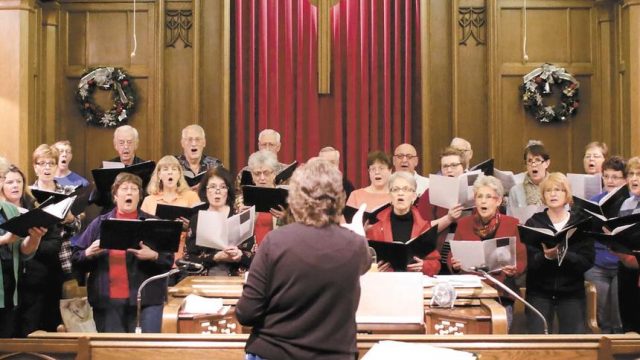John Andrist: Singing Is the Fruit of a Long Life

“Do you want to sing in our choir?”
It was one of the first things they asked me after I moved to my new home in a senior assisted living center here in Fargo two years ago.
I explained that I loved music, but could no longer sing, because I lost my singing voice from the stroke I had three years earlier.
“So”, they responded, “none of us can sing in this choir, but we have fun trying.”
And that’s how it all began. I’ve sung in choirs most of my life — church choirs, Northwest Chorus, the chorus lines in most of the home produced musicals for which Crosby was well known a few years back.
My old Crosby High School had a junior choir and a senior choir, about sixty singers in each. I sang in one or the other for six years. Six is about the same number of men in the DCHS chorus I last heard.
I lament that fact, and the fact that singing has mostly disappeared from the lives of today’s younger music lovers.
Because my wife was a real musician and most of our kids got her musical genes, we sang all the time as a family. We sang in the car, we sang on the school bus, we sang around scouting campfires.
The night we got word that Elaine’s advancing cancer would take her from me within a couple months, we gathered on son Stan’s screened porch and sang all the old songs we had sung a hundred times before. She had a smile on her face every time I glanced her way.
Even though my talent was wanting, and I was never involved in solo performance (for obvious reasons) music seemed to be in my head, assisted by the fact I was admittedly somewhat of a ham. I pretty well practiced my motto: “If you can’t sing good, sing loud!”
The Touchmark Chorus is easily the poorest of the lot. I doubt if any of us had significant training.
But we have fun. The interesting thing is that people love to listen to us, or perhaps watch us. We old goats must be amusing when we get on stage.
One regular is 102. Another guy has a voice that somewhat resembles Louis Armstrong, but we have twice made him do solos. He never quite gets the words straight, but we don’t care, nor does the audience.
We’ve got one guy who is 95 that I have never heard sing. But he can really dance very nimbly, which is somewhat unique in a community where most of us need canes or walkers to stand up. So he is always on stage with us.
Most folks who don’t sing think they can’t sing. Most of them are wrong. When we practice we always have a number of neighbors who watch. Most of them don’t want to join, but they sing along anyway.
We have several who are deep into memory care, rarely participate in anything, but even if they can’t talk they sing and tap their toe in perfect rhythm.
So we keep trying. We know we won’t get any better, and we know we aren’t very good.
But we cherish the fact that in our aging life, where we can no longer do and think like we once could, we can still sing — sort of.
I’m happy that when God decided old people must give up most of what they once were, he decided to let us keep music to the very end.
Fidel is now fiddling elsewhere
You are in a pretty small minority if you can remember the Castro revolution.
If you were a Cuban you likely never would have ever had opportunity to vote or be free to speak as you wished and protest what you didn’t wish for.
Before the Castro revolution Cubans were under the thumb of another dictator, so they have no memory of being free.
Most of us think of Castro as a brutal villain who ruled with an iron hand. And yet, while freely killing and jailing dissidents he did create a society which seemed intent on caring for the poor, as long as they were willing to live on the crumbs provided and never made trouble for him.
Most Cubans appear to be genuinely mourning his death. That’s the way it is when you have no knowledge of what it is like to be free.
For our own part we seem to have decided it’s okay, as long as they don’t export their failed economic systems.
Someday I expect there will be another revolution, but it will probably have to be orchestrated by the shedding of their own blood.




